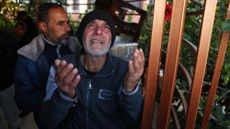How a drafting error could doom Obama's carbon regulations
Looks like the government needs a copy editor...
On June 2nd, the U.S. Environmental Protection Agency unveiled its "Clean Power Plan," a new proposed rule for power plants that could fundamentally alter America's energy landscape. The Plan, which would require a 30 percent reduction of carbon-dioxide emissions from electrical generation by 2030, has enormous implications for the course of the U.S. economy and electrical grid. If implemented, it could be one of the most important features of Obama's legacy as president.
To be implemented, though, the Clean Power Plan must first survive a court challenge. And that's a big problem for the administration, because the EPA's assertion of authority in the rule is likely illegal on many levels.
To understand why the Clean Power Plan may be at risk, we need to take a brief detour into the exciting world of federal environmental law. The EPA's authority to regulate air emissions is governed by the Clean Air Act, which breaks that regulatory authority into different categories. Section 111(d) of the act, for example, gives the EPA authority to set certain standards for existing power plants, while section 112 of the act authorizes EPA to regulate for certain hazardous pollutants. There is a significant amount of overlap between these two categories, and so to avoid duplicative regulation, the EPA was initially prohibited from issuing regulations under 111(d) for pollutants already regulated by 112.
Subscribe to The Week
Escape your echo chamber. Get the facts behind the news, plus analysis from multiple perspectives.

Sign up for The Week's Free Newsletters
From our morning news briefing to a weekly Good News Newsletter, get the best of The Week delivered directly to your inbox.
From our morning news briefing to a weekly Good News Newsletter, get the best of The Week delivered directly to your inbox.
Here's where it gets complicated. In 1990, Congress passed a major set of amendments to the Clean Air Act. The House version of the bill expanded the limitations on 111(d) by prohibiting the EPA from using it whenever an entire category of pollutant sources (e.g. power plants) had already been regulated by 112. Under the old rule, the EPA would be prevented from regulating, say, mercury emissions from power plants under 111(d) if it had already regulated those emissions under 112. Under the new version, once EPA had regulated mercury emissions from power plants under 112, it would have to stick with 112 to regulate other types of power plant emissions. Section 111(d) would be off the table. The Senate version made some minor changes to the statutory language, but didn't make this change.
Ordinarily, when the House and Senate pass different versions of the same bill, any discrepancies are reconciled by a Conference Committee. In this case, however, the Committee was asleep at the switch, and included both the House and Senate amendments to the language in the final bill. Since the two versions of the language are inconsistent, this has created a bit of a statutory puzzle. The U.S. Code includes the House language. The EPA, by contrast, has long maintained that the Senate language is what governs.
This matters, because under the House language, the EPA's Clean Power Plan would be illegal, since the EPA has already issued regulations under 112 of the same "source category" as the existing power plants covered in the new rule.
States have already started to raise issues about the EPA's purported justification of the Clean Power Plan. On June 26th, the attorneys general of Alabama, Alaska, Kentucky, Ohio, Oklahoma, South Carolina, West Virginia, and Wyoming filed legal documents calling the EPA's actions "nothing short of extraordinary" and asking for the rule to be withdrawn.
Sign up for Today's Best Articles in your inbox
A free daily email with the biggest news stories of the day – and the best features from TheWeek.com
This case of Schrödinger's legislation is hardly the only legal issue raised by the Clean Power Plan, or even the most substantially important. As currently proposed, the EPA's rule could fundamentally transform America's electric sector, centralizing authority over what has always been a state prerogative. The economic consequences of the rule could be severe, and risks to the reliability of the electrical grid are quite real. Even in strictly legal terms, the Clean Power Plan raises issues of legal interpretation and administrative law that are far meatier than the issue of the inconsistent amendments.
Given the nature of the stakes involved, it may seem odd that the the Clean Power Plan should stand or fall on such esoteric technicalities. But as the recent D.C. Circuit decision in Halbig shows, legal challenges need not raise profound issues of political philosophy in order to have a major effect on the law.
Depending on who you ask, Halbig either involves an attempt at federal incentivization that backfired or the mother of all drafting errors. Under the Affordable Care Act, popularly known as ObamaCare, states were given the opportunity to set up health insurance exchanges, in which some individuals would be eligible for subsidies to help pay for the health care they chose. The law provides that if a state chooses not to set up an exchange, the federal government can do so. The problem was, subsidies are only authorized on the state exchanges, not the federal ones. This might have been written into the law as an attempt to incentivize states to set up their own exchanges or it might have been an oversight. It depends on who you ask. But given that 36 states declined to set up their own exchange, the lack of subsidies for the federal exchange could have a huge impact. When the IRS went ahead and authorized subsidies for the exchanges anyway, lawsuits naturally followed.
Now, there's not widespread agreement in the courts about the wording of the Affordable Care Act. One appeals court ruled against the federal government, another didn't. But I suspect there will be very little doubt that there was an error in the drafting of Section 111(d). As in Halbig, the EPA finds itself in the position of ignoring the plain language of the U.S. Code while attempting to justify this action by claiming that it shouldn’t be hampered by Congress' "drafting error."
The reality is that government action is thwarted by "technicalities" all the time. Liberals who refuse to take such arguments seriously do so at their own peril.
Josiah Neeley is a Policy Analyst for the Armstrong Center for Energy and the Environment at the Texas Public Policy Foundation.
-
 How should the cricketing world handle Afghanistan?
How should the cricketing world handle Afghanistan?Talking Point England under pressure to boycott upcoming men's match against the nation, which remains an ICC member despite Taliban ban on women's team
By Harriet Marsden, The Week UK Published
-
 Has Gaza's 'safe zone' fallen apart?
Has Gaza's 'safe zone' fallen apart?Today's Big Question At least 12 Palestinians have been killed by Israeli airstrikes on the increasingly fragile al-Mawasi tent camp
By Elizabeth Carr-Ellis, The Week UK Published
-
 The Traitors series three: return of 'completely riveting' reality TV
The Traitors series three: return of 'completely riveting' reality TVThe Week Recommends First show of new series is as 'compelling' as ever, with – of course – a few wicked twists
By Irenie Forshaw, The Week UK Published
-
 US election: who the billionaires are backing
US election: who the billionaires are backingThe Explainer More have endorsed Kamala Harris than Donald Trump, but among the 'ultra-rich' the split is more even
By Harriet Marsden, The Week UK Published
-
 US election: where things stand with one week to go
US election: where things stand with one week to goThe Explainer Harris' lead in the polls has been narrowing in Trump's favour, but her campaign remains 'cautiously optimistic'
By Harriet Marsden, The Week UK Published
-
 Is Trump okay?
Is Trump okay?Today's Big Question Former president's mental fitness and alleged cognitive decline firmly back in the spotlight after 'bizarre' town hall event
By Harriet Marsden, The Week UK Published
-
 The life and times of Kamala Harris
The life and times of Kamala HarrisThe Explainer The vice-president is narrowly leading the race to become the next US president. How did she get to where she is now?
By The Week UK Published
-
 Will 'weirdly civil' VP debate move dial in US election?
Will 'weirdly civil' VP debate move dial in US election?Today's Big Question 'Diametrically opposed' candidates showed 'a lot of commonality' on some issues, but offered competing visions for America's future and democracy
By Harriet Marsden, The Week UK Published
-
 1 of 6 'Trump Train' drivers liable in Biden bus blockade
1 of 6 'Trump Train' drivers liable in Biden bus blockadeSpeed Read Only one of the accused was found liable in the case concerning the deliberate slowing of a 2020 Biden campaign bus
By Peter Weber, The Week US Published
-
 How could J.D. Vance impact the special relationship?
How could J.D. Vance impact the special relationship?Today's Big Question Trump's hawkish pick for VP said UK is the first 'truly Islamist country' with a nuclear weapon
By Harriet Marsden, The Week UK Published
-
 Biden, Trump urge calm after assassination attempt
Biden, Trump urge calm after assassination attemptSpeed Reads A 20-year-old gunman grazed Trump's ear and fatally shot a rally attendee on Saturday
By Peter Weber, The Week US Published